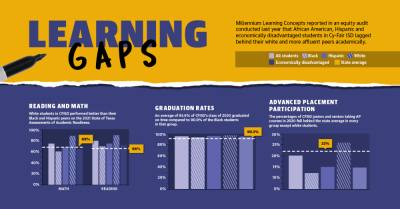Trustee Julie Hinaman said the results of the audit may have been uncomfortable, but the point of it was to learn ways the district could improve.
“We’re very blessed in Cy-Fair ISD to be a high-performing, very efficient, fiscally responsible role model of a school district in Texas, but we aren’t satisfied with that. ... The purpose of the equity audit was to find out where are those places we can get better to better serve all of our kids,” she said at a Jan. 10 work session.
Hinaman helped write the resolution condemning racism the school board unanimously signed in September 2020, which called for an equity audit to help the board close opportunity and achievement gaps among different student groups.
CFISD spent $75,000 to hire Millennium Learning Concepts, a Kentucky-based educational consulting firm, to conduct the audit, which reported Black, Hispanic and economically disadvantaged students lagged behind their peers academically and Black students were disproportionately disciplined in CFISD. Another gap the audit identified was in staffing diversity.
“MLC highlighted that the diversity of the CFISD student body is not represented by the demographic makeup of CFISD professional staff and leadership,” said Onica Mayers, CFISD’s director of employee relations and professional staffing. “Hispanic or Latino students and Asian students do not see teachers and leaders across CFISD who look like them and share their cultural backgrounds.”
The three new trustees elected in November—Natalie Blasingame, Scott Henry and Lucas Scanlon—expressed their disappointment in both the resolution and in the equity audit. The resolution was being reworked with their input as of January.
Meanwhile, Cy-Fair residents and elected officials have called for the resignation of Scott Henry for comments made about Black teachers his second month in office. At the Jan. 10 work session, he called the audit a “pile of rubbish” and a “heap of junk” and said he did not want CFISD to be like Houston ISD, which he noted has a higher dropout rate and percentage of Black teachers.
Video clips of his comments were shared thousands of times on social media, and the trustee lost his job with California-based IT company Splunk as a result, according to a Jan. 14 tweet from the company.
“The statewide average for Black teachers is 10%. Houston ISD—which y’all used [as] a shining example—you know what their average number of percentage of Black teachers is? Thirty-six percent. I looked that up. Know what their dropout rate is? Four percent. I don’t want to be 4%. I don’t want to be HISD,” Scott Henry said. “I want to be a shining example. I want to be the district standard. I want to be the place—the premium place where people go to be.”
While the board reviewed recommendations outlined by MLC, trustees took no immediate action in response to the audit.
A diverse district
Thousands of students and staff members completed surveys or participated in small-group interviews to give MLC a better understanding of school culture and existing equitable practices in CFISD.
MLC founder and President Roger Cleveland defines educational equity as “the provision of personalized resources, instruction and academic support needed for all individuals to reach common goals.”
MLC reported achievement gaps between racial and ethnic groups. White students overall outperformed their Black and Hispanic peers in standardized testing and graduated at higher rates.
The firm cited studies from Johns Hopkins University in 2015 and American University in 2017 about exposure to same-race teachers which showed students have better academic outcomes and tend to be suspended less when they have teachers of the same racial background. But most CFISD students do not have that experience.
As Cy-Fair’s population grows, CFISD has become more diverse. In 2003-04, 52% of students and 85% of teachers were white. By 2019-20, students and teachers were 22% and 66% white, respectively, according to the Texas Education Agency.
However, CFISD has made progress toward more balanced ratios. The district gained a net 96 Black teachers and 145 Hispanic teachers between 2019-20 and 2020-21, while the number of white teachers remained flat, according to the TEA.
Ryan Irving graduated from Langham Creek High School in 2016 and said he can recall having two Black classroom teachers during his entire K-12 education in the district.
“It was something that I personally needed, especially as a third-grader walking into a classroom and seeing ... somebody that looks like me, somebody that talks like me, who is also well-educated, who understood my background and my issues,” said Irving, who ran against Scott Henry in November and now serves as president of the Cy-Fair Civic Alliance. “It honestly made me feel very optimistic as a young child just having that example, and I’m now still friends with that teacher to this day.”
Carlecia Wright, chief diversity officer at Lone Star College System, said organizations should hire racially diverse staff, but that is not the only factor that contributes to student success.
“The key is that organizations should be intentional about their recruitment strategy, but they should also be intentional about making sure that their staff ... are also equipped with culturally relevant curriculum and that they are understanding the lived experience of their student population and that they are equipped with awareness and strategies to mitigate their biases,” she said.
Many public commenters at the Jan. 13 board meeting said they support the board’s original resolution and the need for the audit. Odus Evbagharu, a CFISD graduate and the Democratic Party chair for Harris County, pointed out Cy-Fair High School was once segregated, and many individuals in the room were old enough to remember the civil rights movement of the 1960s.
Other community members—including Scott Henry in a statement—said they want to see the district “get back to the basics” of education and avoid politics.
“To be honest, I’m more concerned about my kids’ grades than the race of the person teaching them,” said Todd LeCompte, a CFISD father who unsuccessfully ran for the board last fall. “It seems like lots of these things being discussed in the school district is more focused on race these days rather than performance. Politics has infiltrated this school district.”
Room for improvement
District leaders acknowledged disparities between white students and students of color based on the audit, which highlighted evident learning gaps. About 88% of white students met or exceeded their math targets in 2021 compared to 60% and 68% of Black and Hispanic students, respectively.
Additionally, nearly 40% of all suspensions in 2020-21 were of Black students, when 19% of the student population was Black, according to the TEA.
“Similar to achievement patterns, this discipline pattern is a districtwide concern consistent across CFISD and has profound consequences for student learning and academic outcomes,” Mayers said.
Some district employees interviewed for the audit recognized a focus on equity was slowly being implemented and some progress had already been made. Others called for more meaningful professional development regarding diversity, equity and inclusion.
MLC’s recommendations for the district included collaborating with diverse stakeholders to develop an equity plan; launching an equity dashboard and/or equity scorecard system; creating a position to support the district’s commitment to equity; creating a central office equity department; establishing an equity advisory committee; and developing and approving a formal equity policy.
Next steps
Hinaman said the board will not necessarily take action on each recommendation but said the data confirms unintended bias, achievement gaps and inconsistencies in discipline exist.
District officials did not have a concrete plan or timeline regarding next steps as of press time. Leslie Francis, assistant superintendent for communication and community relations, said the board may add objectives or targets to its Board Monitoring System; the administration could recommend next steps to the board; or both or neither could take place.
In addition to the recommendations, MLC commended CFISD for equity efforts already in place, such as investments to provide technology and meals to students during the pandemic; support for English language learners; some professional development on diversity and equity; and the board’s resolution condemning racism. However, board members in January decided to “sunset” the original resolution and write a new version due to concerns expressed by the new board members.
“When we’re re-evaluating this resolution, ... we don’t need to denigrate white people because they’re white and say that you’ve got systemic racism. I fundamentally do not agree with that statement,” Scanlon said. “I think if we’re going to approach helping our kids, then I think it comes back to creating the right classroom work culture and enabling and holding our kids accountable and driving that back to them.”
Superintendent Mark Henry closed the Jan. 13 meeting with an emotional apology to his Black employees for hurt they may have felt following the work session earlier that week. He shared a personal testimony from his own family to explain the importance of a diverse workforce.
He said the Hispanic, Asian, white, Black and LGBTQ communities are all represented among his children and grandchildren, and he wants them to see people who look like them.
“We want the best teachers we can get in this community, but we want them to be diverse,” he said. “The way you come up with a diverse workforce is you go look different places than you’ve ever looked before.”







